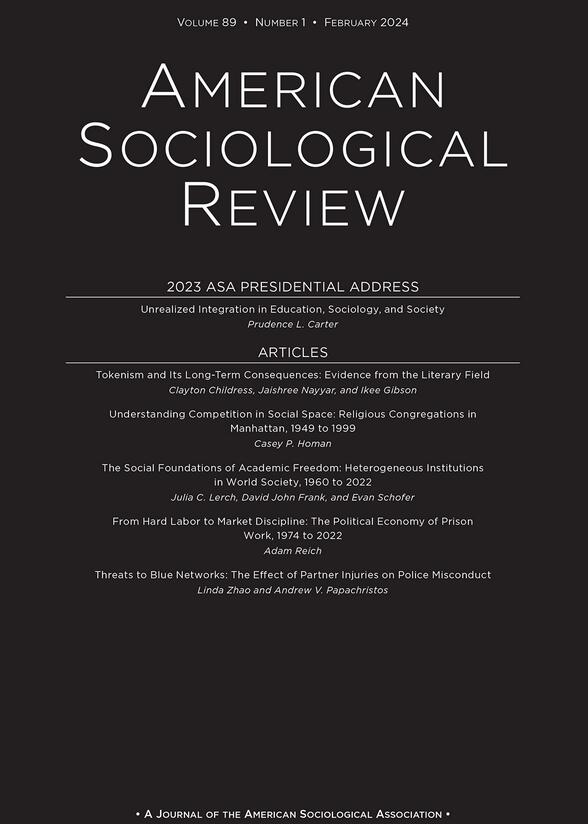实现包容性收入增长的途径:国民增长概况的比较分解
IF 6.2
1区 社会学
Q1 SOCIOLOGY
引用次数: 7
摘要
尽管人们对收入不平等越来越感兴趣,但学者们对包容性收入增长的基本机制以及这些机制在各国之间的差异仍存在分歧。本研究引入了国民增长概况的概念,即税收、转移支付、组成和其他因素(包括市场制度)的变化对一个国家收入分配变化的加性贡献。我们提出了一个分解框架来衡量八个高收入国家从20世纪80年代到2010年代的国民增长状况。我们的研究结果对不平等加剧的社会学和经济学观点进行了评判。首先,我们发现政策驱动的税收和转移支付变化是收入分配尾部包容性增长的主要驱动因素。其次,教育程度的提高对收入增长的贡献最大,但对包容性增长的贡献始终较小。当考虑到教育的变化时,择偶和单亲的变化对不平等的变化几乎没有影响。第三,包括市场制度在内的其他因素的变化加剧了美国等国的不平等,但法国和德国的不平等程度较低。如果美国与荷兰税收政策、丹麦转移政策或大多数其他国家的其他因素相匹配,它本可以实现比观察到的更具包容性的收入增长。本文章由计算机程序翻译,如有差异,请以英文原文为准。
Pathways toward Inclusive Income Growth: A Comparative Decomposition of National Growth Profiles
Despite rising interest in income inequality, scholars remain divided over the mechanisms underlying inclusive income growth and how these mechanisms vary across countries. This study introduces the concept of national growth profiles, that is, the additive contribution of changes in taxes, transfers, composition, and other factors including market institutions to changes across a country’s income distribution. We present a decomposition framework to measure national growth profiles for eight high-income countries from the 1980s to 2010s. Our findings adjudicate competing sociological and economic perspectives on rising inequality. First, we find that policy-driven changes in taxes and transfers are the dominant drivers of inclusive growth at the tails of the income distributions. Second, rising educational attainment contributes most to income growth across the distribution, but consistently contributes to less-inclusive growth. When changes in education are considered, changes in assortative mating and single parenthood have little consequence for changes in inequality. Third, changes to other factors including market institutions increased inequality in countries such as the United States, but less so in France and Germany. Had the United States matched the changes to Dutch tax policy, Danish transfer policy, or other factors of most other countries, it could have achieved more inclusive income growth than observed.
求助全文
通过发布文献求助,成功后即可免费获取论文全文。
去求助
来源期刊

American Sociological Review
SOCIOLOGY-
CiteScore
13.30
自引率
3.30%
发文量
35
期刊介绍:
The American Sociological Association (ASA) is a non-profit membership association established in 1905. Its mission is to advance sociology as a scientific discipline and profession that serves the public good. ASA is comprised of approximately 12,000 members including faculty members, researchers, practitioners, and students in the field of sociology. Roughly 20% of the members work in government, business, or non-profit organizations.
One of ASA's primary endeavors is the publication and dissemination of important sociological research. To this end, they founded the American Sociological Review (ASR) in 1936. ASR is the flagship journal of the association and publishes original works that are of general interest and contribute to the advancement of sociology. The journal seeks to publish new theoretical developments, research results that enhance our understanding of fundamental social processes, and significant methodological innovations. ASR welcomes submissions from all areas of sociology, placing an emphasis on exceptional quality.
Aside from ASR, ASA also publishes 14 professional journals and magazines. Additionally, they organize an annual meeting that attracts over 6,000 participants. ASA's membership consists of scholars, professionals, and students dedicated to the study and application of sociology in various domains of society.
 求助内容:
求助内容: 应助结果提醒方式:
应助结果提醒方式:


